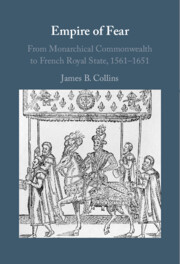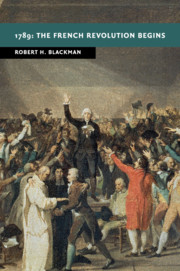Refine search
Actions for selected content:
11 results
Chapter 6 - The Revolution’s Political and Theatrical Stages
- from Part II - In Practice
-
- Book:
- Theatre and Censorship in France from Revolution to Restoration
- Published online:
- 30 November 2025
- Print publication:
- 18 December 2025, pp 190-214
-
- Chapter
- Export citation
1 - The Estates General
-
- Book:
- Empire of Fear
- Published online:
- 27 November 2025
- Print publication:
- 11 December 2025, pp 31-71
-
- Chapter
- Export citation
2 - From Commonwealth to State
-
- Book:
- Empire of Fear
- Published online:
- 27 November 2025
- Print publication:
- 11 December 2025, pp 72-112
-
- Chapter
- Export citation
Introduction
-
- Book:
- Empire of Fear
- Published online:
- 27 November 2025
- Print publication:
- 11 December 2025, pp 1-30
-
- Chapter
-
- You have access
- HTML
- Export citation

Empire of Fear
- From Monarchical Commonwealth to French Royal State, 1561–1651
-
- Published online:
- 27 November 2025
- Print publication:
- 11 December 2025
11 - The French Revolution
- from Part III - Revolutionary Convergences
-
- Book:
- Democracy's Double Helix
- Published online:
- 09 September 2025
- Print publication:
- 14 August 2025, pp 241-287
-
- Chapter
- Export citation
1 - La chose publique de nostre royaume
-
- Book:
- The French Monarchical Commonwealth, 1356–1560
- Published online:
- 05 May 2022
- Print publication:
- 19 May 2022, pp 29-72
-
- Chapter
- Export citation
Chapter 3 - Frank and Free
-
- Book:
- Political Thought in the French Wars of Religion
- Published online:
- 23 April 2021
- Print publication:
- 13 May 2021, pp 62-93
-
- Chapter
- Export citation
Chapter 2 - The Estates General Sitting as a National Assembly
-
- Book:
- 1789: The French Revolution Begins
- Published online:
- 29 July 2019
- Print publication:
- 01 August 2019, pp 72-114
-
- Chapter
- Export citation
Chapter 3 - The King Responds
-
- Book:
- 1789: The French Revolution Begins
- Published online:
- 29 July 2019
- Print publication:
- 01 August 2019, pp 115-143
-
- Chapter
- Export citation

1789: The French Revolution Begins
-
- Published online:
- 29 July 2019
- Print publication:
- 01 August 2019
